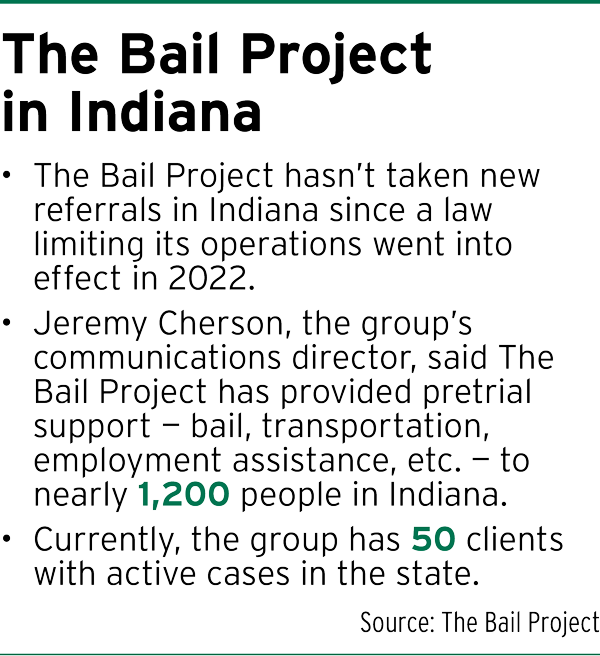Subscriber Benefit
As a subscriber you can listen to articles at work, in the car, or while you work out. Subscribe NowAfter running into another roadblock on its quest to overturn a state law that limits its operations in Indiana, The Bail Project isn’t committing one way or the other on whether it will continue working in the state.
The national organization advocates for an end to cash bail and pays bail for indigent pretrial detainees. The Bail Project started operating in Indiana in 2018, first in Marion County and later in Lake County.
But its future is uncertain after the 7th Circuit Court of Appeals affirmed a district court’s denial of the organization’s motion for a preliminary injunction against a law that puts limits on whom charitable bail organizations can bail out of jail.

Jeremy Cherson, The Bail Project’s director of communications, said the organization was disappointed with the ruling, and while it plans to continue its legal battle, The Bail Project hasn’t accepted new referrals since the law went into effect July 1, 2022.
Now, outside of the 50 active client cases the organization is keeping up with in Indiana, it’s not clear what role The Bail Project may play in one of the first states to enact such restrictions.
“I think it’s something we’re still continuing to take stock of,” Cherson said.
The Bail Project is challenging House Enrolled Act 1300, which defines “charitable bail organization” and prevents any person charged with a violent crime from being bailed out by a charitable bail group. Anyone charged with a new felony who has a past conviction of a violent crime also can’t receive bail assistance from charitable bail groups.
Paying bail not ‘expressive activity’
The 7th Circuit opinion that came down in early August largely dealt with a First Amendment claim. When the American Civil Liberties Union of Indiana filed a lawsuit on behalf of The Bail Project in May 2022, part of the argument was that paying bail “represents the organization’s essential protest and expressive activity.”
 But a two-thirds majority of the appellate court’s panel disagreed, ruling that paying bail “does not communicate even the most general version of The Bail Project’s message — its opposition to cash bail.”
But a two-thirds majority of the appellate court’s panel disagreed, ruling that paying bail “does not communicate even the most general version of The Bail Project’s message — its opposition to cash bail.”
“Without knowledge of The Bail Project’s mission and repeat-player status, a reasonable observer would not understand its payment of cash bail at the clerk’s office as an expression of any message about the bail system,” Judge Thomas Kirsch wrote for the majority that also included Senior Judge Joel Flaum.
Judge Candace Jackson-Akiwumi dissented, writing that the majority didn’t consider the context and audience.
“When considering the context — including the relevant audience — of The Bail Project’s actions, I see a high likelihood that those who observed the conduct understood that some type of message was being conveyed,” she wrote.
Bail funds ‘not just about freeing people’

Jocelyn Simonson, a professor of law and associate dean for research and scholarship at the Brooklyn Law School, said she has studied and worked with bail funds for more than a decade. The reason bail funds like The Bail Project are important, Simonson said, is because they’re making a “larger democratic point” about the cash bail system and criminalization.
“Community bail funds are not just about freeing people,” said Simonson, whose recently published book, “Radical Acts of Justice: How Ordinary People Are Dismantling Mass Incarceration,” is partly about bail funds.
When groups like The Bail Project post bail for people over a period of time, Simonson said that amounts to a “powerful” political statement.
She said she sees legislation like HEA 1300 as part of a larger backlash against bail funds, of which she said there are slightly fewer than 100 that are active in the United States — compared to just three in 2015.
The Indiana Legislature, Simonson opined, didn’t pass a new law because it was concerned about people being bailed out of jail. Instead, she said lawmakers were responding to the political pressure bail funds are applying.
“That’s what they’re afraid of,” she said. “They’re afraid of the message.”
Who’s held to a higher standard?

Jeff Clayton, executive director of the American Bail Coalition, said he’s hopeful the 7th Circuit’s decision will spur more legislation around the country to regulate bail funds.
“This certainly tells other state legislatures they’re on firm ground if they do want to take it up,” he said.
The American Bail Coalition is comprised of surety insurance companies that back commercial bail bonds.
There’s an argument on both sides of the bail fund debate about which side is held to a higher standard: the nonprofit or for-profit side. The commercial side has two layers of regulations, Clayton said: There’s one for the bondsmen and one for the insurance companies that underwrite them.
“I don’t think we’re getting away with one,” he said. “… They got a little taste of regulation.”
Part of The Bail Project’s argument is that HEA 1300 violates its rights under the equal protection clause of the 14th Amendment by limiting its activity but not the activity of for-profit entities.
The Indiana Attorney General’s Office, which is representing the state in the legal proceedings, declined to comment on the record.
What’s next?
The Bail Project has filed a petition for the 7th Circuit to rehear the case en banc.
The organization argues the 7th Circuit majority’s conclusion is in conflict with Spence v. Washington, 418 U.S. 405 (1974).
In Spence, the U.S. Supreme Court ruled the appellant’s activity — displaying an upside down flag — when “combined with the factual context and environment in which it was undertaken,” leads to the conclusion that he was engaging in protected speech.
Judge Jackson-Akiwumi cited Spence in her dissent.
The Bail Project also acknowledged in its filing that the 7th Circuit decision could have a far-reaching impact.
“Given the numerous other jurisdictions where The Bail Project operates, not to mention the proliferation of similar groups around the country that are seeking to influence cash-bail practices in the same way as The Bail Project, the failure to recognize that the act of paying bail by these groups is expressive allows for jurisdictions to impose crippling restrictions, like Indiana’s, specifically targeting these groups and aiming to end or hinder their expressive activities,” the group wrote. “The injury to the First Amendment interests occasioned by the panel majority’s decision in this case is therefore not limited to Indiana.”•
Please enable JavaScript to view this content.
